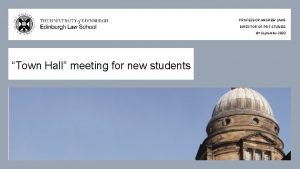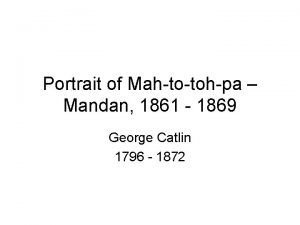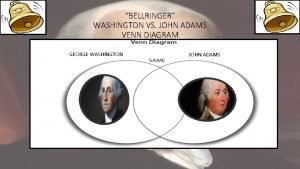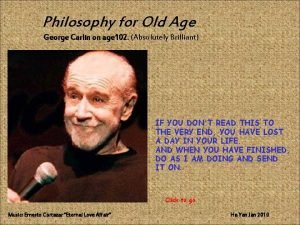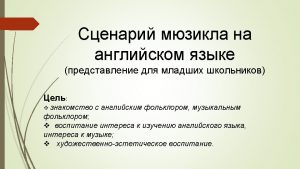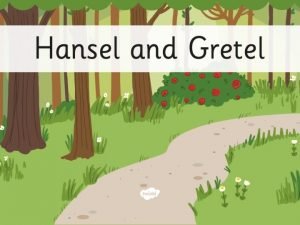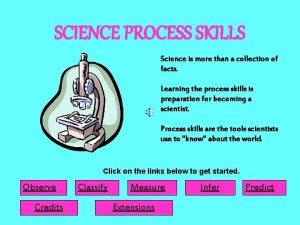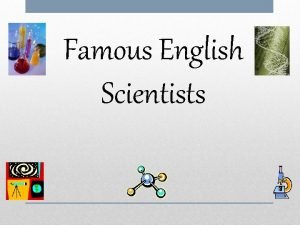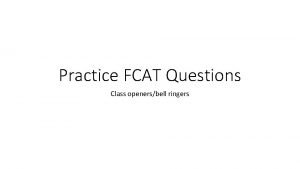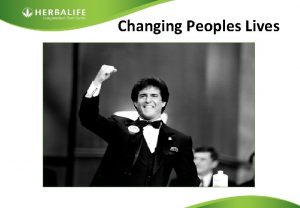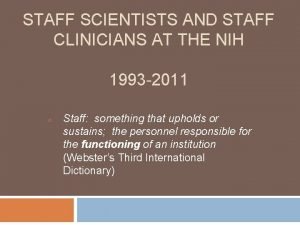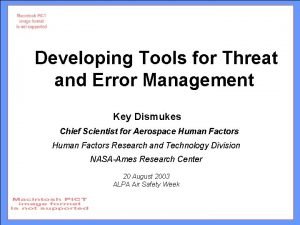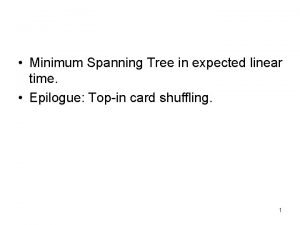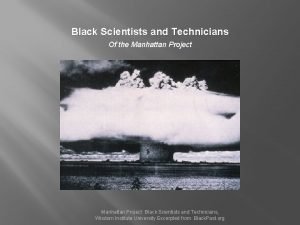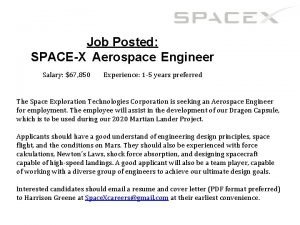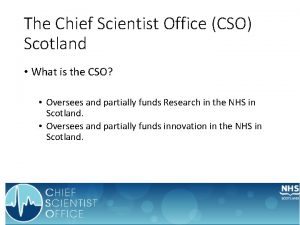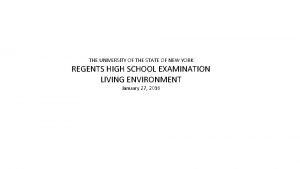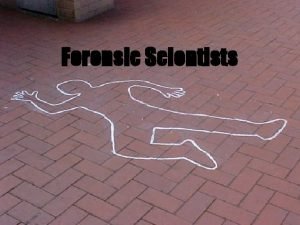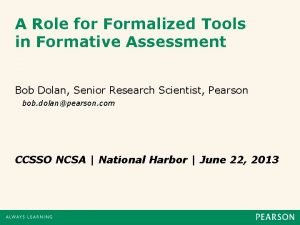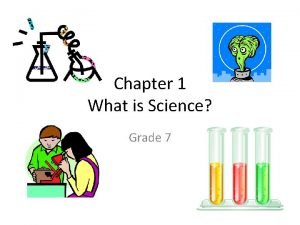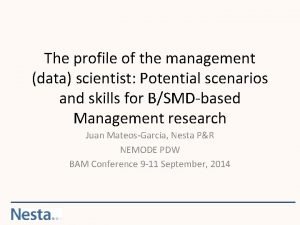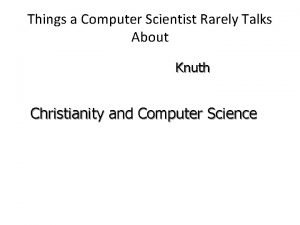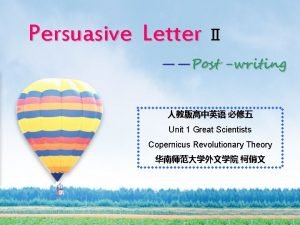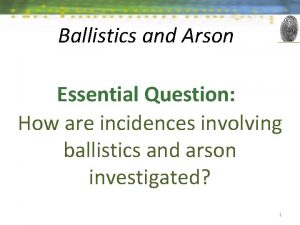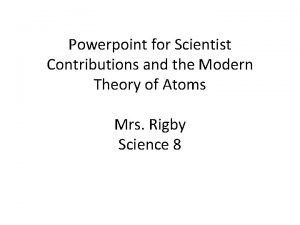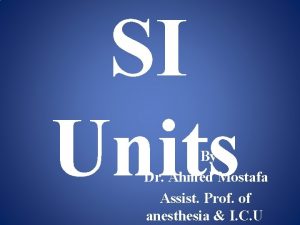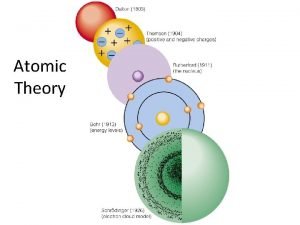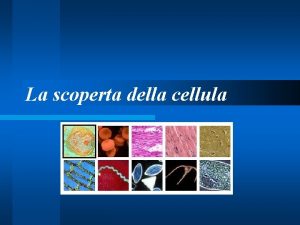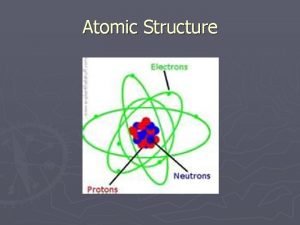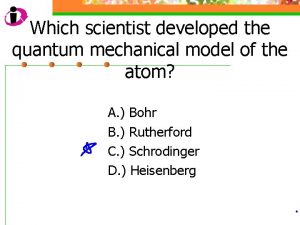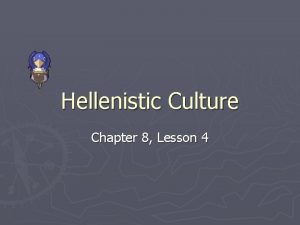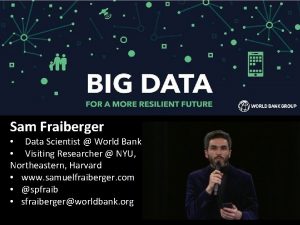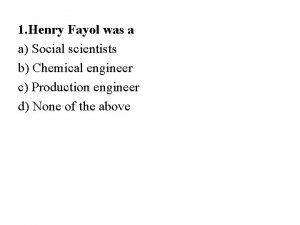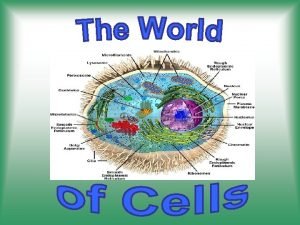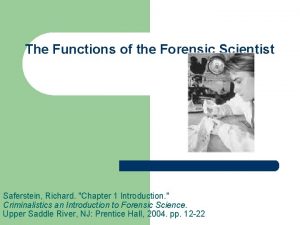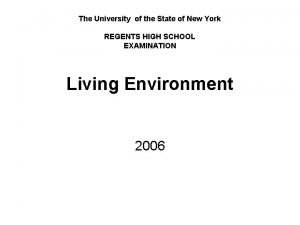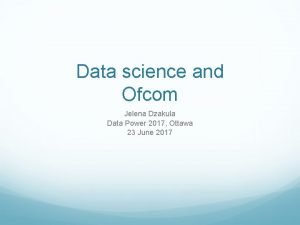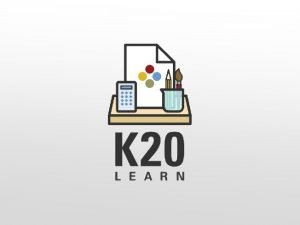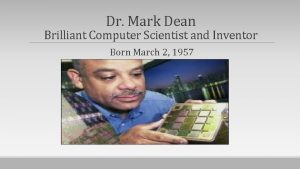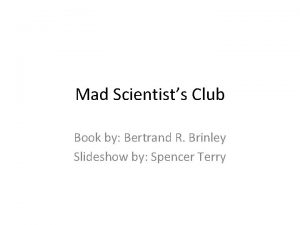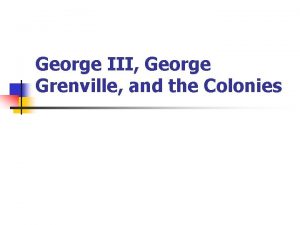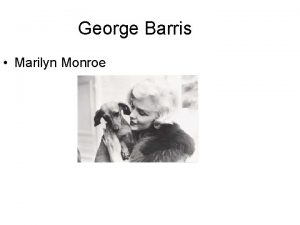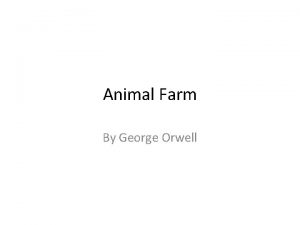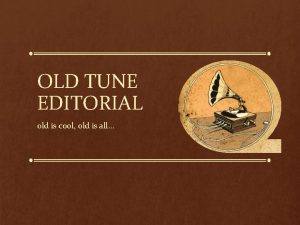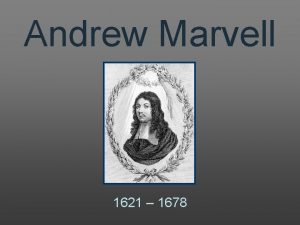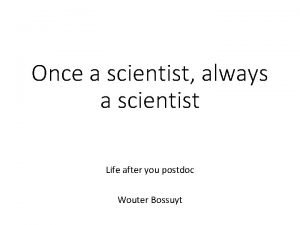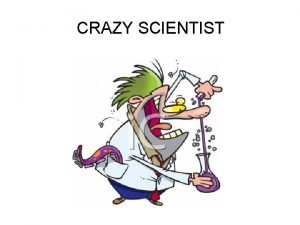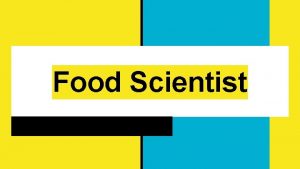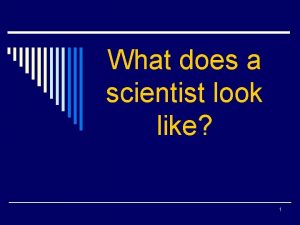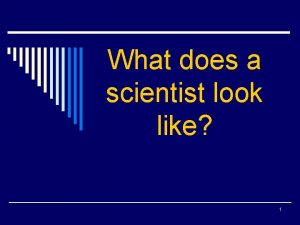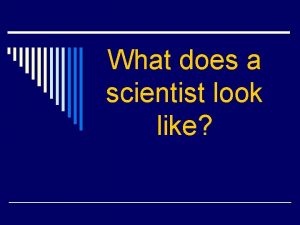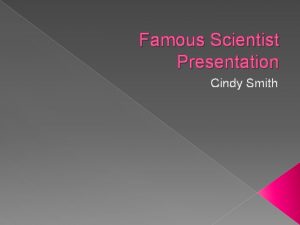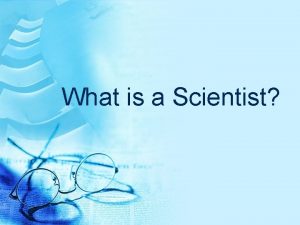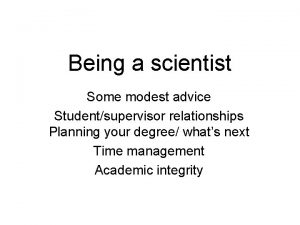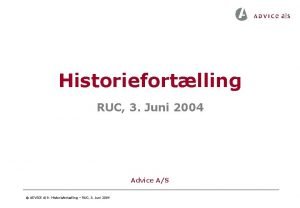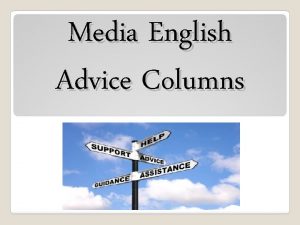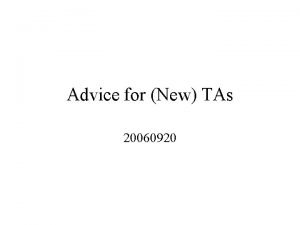Advice from an old scientist Andrew George Director
















































- Slides: 48

Advice from an ‘old’ scientist Andrew George Director of the Graduate School Director of the School of Professional Development Professor of Molecular Immunology

Ph. D 1987 • Little pressure on completion • No skills or similar courses • Worked with a single supervisor • Read books • Medawar, Haldane, Popper • statistics

Peter Medawar • Advice to a young scientist

What do you need to be a good scientist • skills • attitudes

Passion and enthusiasm for science • Passion for SCIENCE - not passion for oneself • Need to want to understand the truth • Want to succeed in finding the answer • Does not stop one having a passion for oneself and desire to win for oneself James Watson: The Double Helix

Curiosity • Read around the subject • Talk to people about what they do • Read stuff that is irrelevant

Hard work, diligence, doggedness, drive • Do not confuse long hours for hard work • Intellectual laziness “I know the price of success: dedication, hard work, and an unremitting devotion to the things you want to see happen. ” Frank Lloyd Wright

Resilience

Integrity • To truth • Go the extra mile to be willing to find faults with your own data – you will know it better than anyone else! • To colleagues • Proper attribution • generosity • To the functioning of science • Reviewing • Keeping good lab books

Humility and arrogance • Humbly arrogant • Not art! The facts can prove a beautiful hypothesis wrong.

Professional behaviour • Behaving properly • Following codes of conduct and rules • Politeness

Intelligence / imagination • Nice to have, • not must have

So how to succeed?

Have a good question • From the question flows the project • If you know the question then it is often obvious what you have to do • Problems with research often occur because the researcher does not know (or has forgotten) what the question is

What is a good question? • There are 10000000000 s of questions out there • We can only answer 1 of them at a time • Picking the good one is the most critical step in science

The question has to be interesting • Useful • Intriguing • Not obvious


Science is the art of the possible • Peter Medawar

Therefore your question has to be answerable • Scientific approach • With the equipment and techniques available • Do-able resources

What questions can science answer? • A hypothesis, proposition or theory is scientific only if it is falsifiable

All swans are white

All swans are white

Scientific approach • Not all questions can be answered by science. These should either be avoided or reformulated so that they can be answered.

Scientific or non scientific questions • • Does God exist? Does life have meaning? Why am I moved by Allegri’s Miserere? Why do I love my wife?

Scientific or non scientific questions • Did God create the world in 23 October 4004 BC? • Does a person motivated by being given a meaning to their project work harder? • Does music stimulate the release of endorphins? • Is a human more likely to partner someone who shares their educational background?

Understand scientific methodology • Not scientific techniques, but how science works • You need to learn how to pick up/develop techniques - but a list of techniques less useful than an understanding of science

If possible collaborate • Fun • Different skill sets • Different mind sets • Rules of collaboration • If 1+1=3 - be generous in acknowledgement • Easier to collaborate if you like each other

Co-authors up to 2002 Adebakin S. Coutelle C. Adams G. P. Crompton T. Aichinger G. Dallman M. J. Ali R. R. Danga R. Ananthesayanan B. Davies K. A. Andrew S. M. De Alwis M. Arancibia-Cárcamo C. V. Deonarain M. P. Ardjomand N. Diss J. K. J. Arnett H. A. Djamgoz M. B. A. Awad H. M. Dong R. Barber P. C. Dorling A. Barboni E. Dougan T. Barton D. Drake A. F. Batchelor J. R. Dyke R. J. Blades M. C. El-Gamil M. Blyth A. Epenetos A. A. Boleti E. Evans D. Bolognesi A. Farrar T. Bomphray C. C. Fehervari Z. Bookman M. A. Folkard S. G. Browning A. Foreman R. C. Buckley C. Foxwell B. M. J. Buttery L. Fraser S. P. Byrnes A. P. French R. R. Cairns T. Gale R. Callard R. E. Gallop J. L. Chan C. Garrido M. A. Chan, G Glennie M. J. Chapman P. T. Gooden C. S. R. Chen D. Gore M. Cheshire N. J. W. Gray D. Chioni A-M. Greenman J. Coffin R. S. Griffith M. E. Comer R. M. Gundel R. H. Cook H. T. Haber E. Cook J. A. Hale G. Coulthart A. Hamblin T. J. Courtenay-Luck N. S. Harbottle R. P. Page 28 Harrison A. A. Hart S. L. Haskard D. O. Háskova Z. Heelan B. T. Heuhns T. Y. Hornick P. Hounsell E. F. Houston L. L. Hsuan J. J. Hudde T. Hughes S. P. F. Hussain R. Huston J. S. Imami N. Isaacs J. D. Jacobus C. M. Jamar F. Jin D. Johns M. Jones T. Jost C. R. Kadifachi M. Kashefi K. Kemball-Cook G. Kerouedan C. King C. A. King W. J. Kinnon C. Kinsella M. T. Knight A. M. Korn D. . Mirza F. Kurucz I. Moore E. G. Kuyama J. Moreno M. B. Larkin D. F. P. Morgan S. H. Law P. Morris R. J. Lechler R. I. Naudeer S. Lee J. Nelson D. J. Lee L. Nicholls P. J. Lemoine N. R. Nicholson S. Levinsky R. J. Nicolls P. J. Levy J. B. O’Reilly N. J. Lightstone L. Ono S. J. Lloyd L. J. Oppermann H. Lord G. M. Oral H. B. Luthert P. J. Osawa H. Mackett M. Osman S. Mahiouz D. L. Palmer D. B. Maidment G. Panayi G. Mailhos C. Pani F. Manunta M. Patel M. J. Marandi M. B. Pemberton S. Martin S. R. Penney C. A. Mattia-Goldberg C. Perez P. Mc. Allister J. C. Peters A. M. Mc. Bride H. M. Pignatelli M. Mc. Cartney J. E. Pitzalis C. Mc. Cormack A Pliego Rivero B. Mc. Indoe A. Polak J. M. Mc. Kane W. Pulford K. A. F. Mc. Kay P. F. Pusey C. D. Mc. Vey J. H. Qian J. -H. Mezzanzanica D. Rankin A. M. Midulla M. Rashid M. Rayner S. A. Tay E. Reisbeck K. Taylor K. M. Renouf D. V. Taylor-Fishwick D. A. Ring C. J. A. Theoharis S. Ritter M. A Thomas H Robinson M. K. Thompson M. Rogers N. J. Thrasher A. J. Rowlinson-Busza G. Ting J P-Y Sagoo P. Titus J. A. Salama A. Totty N. F. Salama A. D. Tsang Y. T. Schnoor L. Tuddenham E. G. D. Sedibane L. M. Turner A. N. Segal D. M. Turner D. J. Sepp A. Tutt A. L. Seymour L. W. Urch C. E. Shelbourn T. E. Verma R. Siligardi G. Waldmann H. Smith A. J. Walters M. T. Smith J. Webb E. J. Smith L. J. Weber M. Spellerberg M. B. Weiner L. M. Spooner R. A. Weller R. Stafford W. F. Wilson A. Stark J Winston R. Stevenson F. K. Wolf E. J. Stevenson G. T. Wolfe J. H. Stirpe F. Wolfert M. A. Stocker C. J. Wood M. J. A. Streilein J. W. Wunderlich J. R. Tai M. -S. Xue S. A. Tan P. H. Yates A. Taube D. Zhang F.

…. from ~30 different countries Page 29 © Imperial College London

Pick good laboratories and departments • Not necessarily the ones that look nicest! • Colleagues support and challenge and push

Pick a good supervisor • • • Good scientist Will look after you You respect Compatible style Need not be your best friend

Communicate • • Have a story Papers and talks Remember your audience Decide what you want to communicate

Diagrams Tufte: The Visual Display of Quantitative Information

Diagrams (1880) Tufte: The Visual Display of Quantitative Information

Writing • Plan, plan and then plan some more • Get it as close to right first time • Less is normally more “I didn't have time to write a short letter, so I wrote a long one instead. ” Mark Twain”

Careers post Ph. D

Career • Say YES whenever possible • Take opportunities • Career is your responsibility - but no one owes you a living! • Career is rarely planned – or if it is it does not work out • But prepare for and take opportunities • Napoleon liked lucky generals

Collegiate • Be collegial • Do not be a door mat

What is the future?

Publishing • Tyranny of impact factor • Future tyranny of h index • Still publishing as if in Caxton’s day • Slow • Expensive (peer review) • Incomplete • Need to publish primary data • Short reports linked to primary data • Continual upgrading of story • Journals will be collections – like Faculty 1000

Correlation between IF and times paper cited

Ranking of papers by citation – h index

Ranking of papers by citation – h index

Even personal citations not useful • Publications of record • Papers influence in field • ‘false’ reasons for citation

Reward system • At the moment reward scientists (give them grants, promote them) on the basis of publications and grant income • However, this puts in perverse drivers • Sexy fields • Not new or solid fields • Competition is useful.

Interdisciplinary science • Yes • But need to have a disciplinary base!

Collaborative science • Increasingly important • Small people working with big data • Data collection and data analysis may be separated – astronomy • Polymath project • a new combinatorial proof to the density version of the Hales-Jewett theorem 40 people contributed, solved in 7 weeks, 2 papers

Final words Enjoy your research
 Andrew lang director
Andrew lang director George catlin (political scientist)
George catlin (political scientist) Venn diagram george washington and king george iii
Venn diagram george washington and king george iii King george vs george washington
King george vs george washington George carlin on age 102
George carlin on age 102 Once upon a time there lived an old man and an old woman
Once upon a time there lived an old man and an old woman Once upon a time there lived
Once upon a time there lived What's your name? how old are you?
What's your name? how old are you? Once upon a time there lived a little girl
Once upon a time there lived a little girl Data scientist ausbildung wien
Data scientist ausbildung wien Paragraph on scientist
Paragraph on scientist Famous english scientists
Famous english scientists A scientist performs an experiment, and an actor performs a
A scientist performs an experiment, and an actor performs a Herbalife changing people's life
Herbalife changing people's life Carol rogers forensic scientist
Carol rogers forensic scientist Staff scientist nih
Staff scientist nih Scientist tools
Scientist tools Czech scientist
Czech scientist Far side rocket scientist
Far side rocket scientist Moddie taylor quotes
Moddie taylor quotes Aerospace engineer salary
Aerospace engineer salary Cso scotland
Cso scotland The hormone adrenaline can affect only cells with *
The hormone adrenaline can affect only cells with * What does forensic mean in latin
What does forensic mean in latin Scientist tools
Scientist tools A scientist's open-mindedness should always be balanced by
A scientist's open-mindedness should always be balanced by Data scientist
Data scientist Things a computer scientist rarely talks about
Things a computer scientist rarely talks about Paragraph on scientist
Paragraph on scientist Burned fire scientist questions arson
Burned fire scientist questions arson Electron cloud model
Electron cloud model Si derived unit of pressure scientist
Si derived unit of pressure scientist Name of atom
Name of atom Czech scientist
Czech scientist Hooke scientist cell theory
Hooke scientist cell theory What scientist discovered the electron
What scientist discovered the electron Which scientist developed the quantum mechanical
Which scientist developed the quantum mechanical Hellenistic culture developed as a result of
Hellenistic culture developed as a result of Sam fraiberger
Sam fraiberger Who is the english scientist that discovered cell in 1665
Who is the english scientist that discovered cell in 1665 What makes a scientist
What makes a scientist Harmony not discord
Harmony not discord Robert hooke cell theory
Robert hooke cell theory Functions of a forensic scientist
Functions of a forensic scientist Scientist hypothesize that cabbage broccoli cauliflower
Scientist hypothesize that cabbage broccoli cauliflower Jelena dzakula
Jelena dzakula Avogadro scientist
Avogadro scientist Mark dean awards
Mark dean awards The mad scientist club
The mad scientist club
